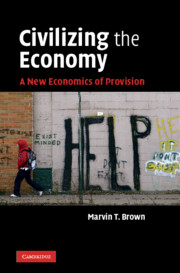Book contents
- Frontmatter
- Contents
- List of figures
- List of tables
- Preface
- 1 Introduction: creating a just and sustainable economy
- Part I Creating a new economic framework
- Part II The civic option
- Part III A civic view of labor, land, and money
- Part IV Civilizing economic systems
- Part V A civic agenda
- Appendix: Free enterprise and the economics of slavery
- Bibliography
- Index
Appendix: Free enterprise and the economics of slavery
Published online by Cambridge University Press: 05 June 2012
- Frontmatter
- Contents
- List of figures
- List of tables
- Preface
- 1 Introduction: creating a just and sustainable economy
- Part I Creating a new economic framework
- Part II The civic option
- Part III A civic view of labor, land, and money
- Part IV Civilizing economic systems
- Part V A civic agenda
- Appendix: Free enterprise and the economics of slavery
- Bibliography
- Index
Summary
Of the many contradictions we witness between fact and fiction, one that would rank among the most significant is the contradiction between the small-town image commonly used to represent the essence of free enterprise and the real context of early capitalism – the Atlantic trade among the peoples of Europe, Africa, and the Americas. Here is the fiction:
It is not from the benevolence of the butcher, the brewer, or the baker, that we expect our dinner, but from their regard to their own self-interest. We address ourselves, not to their humanity but to their self-love, and never talk to them of our own necessities but of their advantages.
Such a context is not so difficult to imagine. Small shop owners provide different goods to each other, and the best way of doing this is for each to be guided by one's self-interest, since in this intimate setting it is certainly in their self-interest to provide a good product at a good price. How nice that we so easily do what is best for us and it turns out best for our neighbors.
The reality of commerce when Adam Smith was composing The Wealth of Nations was something else. The center of this trade was not the town square, but the Atlantic Ocean, which was used for the trafficking of millions of captive Africans to the Americas and the trafficking of American-grown sugar and tobacco to the Europeans, as well as the Europeans sending other products and services – such as credit and weapons – that went along with the development of any empire.
- Type
- Chapter
- Information
- Civilizing the EconomyA New Economics of Provision, pp. 235 - 253Publisher: Cambridge University PressPrint publication year: 2010
- 2
- Cited by



